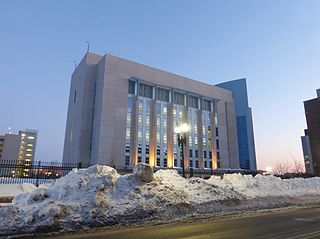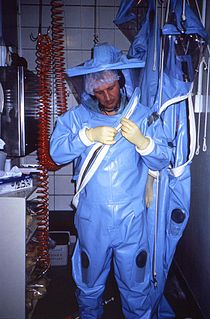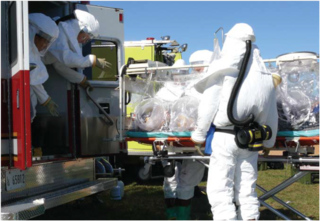Related Research Articles

Bioterrorism is terrorism involving the intentional release or dissemination of biological agents. These agents are bacteria, viruses, insects, fungi or toxins, and may be in a naturally occurring or a human-modified form, in much the same way as in biological warfare. Further, modern agribusiness is vulnerable to anti-agricultural attacks by terrorists, and such attacks can seriously damage economy as well as consumer confidence. The latter destructive activity is called agrobioterrorism and is a subtype of agro-terrorism.

The Centers for Disease Control and Prevention (CDC) is the national public health agency of the United States. It is a United States federal agency, under the Department of Health and Human Services, and is headquartered in Atlanta, Georgia.
Biodefense refers to measures to restore biosecurity to a group of organisms who are, or may be, subject to biological threats or infectious diseases. Biodefense is frequently discussed in the context of biowar or bioterrorism, and is generally considered a military or emergency response term.

A biosafety level (BSL), or pathogen/protection level, is a set of biocontainment precautions required to isolate dangerous biological agents in an enclosed laboratory facility. The levels of containment range from the lowest biosafety level 1 (BSL-1) to the highest at level 4 (BSL-4). In the United States, the Centers for Disease Control and Prevention (CDC) have specified these levels. In the European Union, the same biosafety levels are defined in a directive. In Canada the four levels are known as Containment Levels. Facilities with these designations are also sometimes given as P1 through P4, as in the term P3 laboratory.

A biological hazard, or biohazard, is a biological substance that poses a threat to the health of living organisms, primarily humans. This could include a sample of a microorganism, virus or toxin that can adversely affect human health. A biohazard could also be a substance harmful to other animals.

Plum Island Animal Disease Center (PIADC) is a United States federal research facility dedicated to the study of foreign animal diseases of livestock. It is part of the Department of Homeland Security Directorate for Science and Technology, and operates as a partnership with the U.S. Department of Agriculture. The facility's director is Dr. Larry Barrett.

Kanatzhan "Kanat" Alibekov – known as Kenneth "Ken" Alibek since 1992 – is a Kazakh-American physician, microbiologist, and biological warfare (BW) expert. He rose rapidly in the ranks of the Soviet Army to become the First Deputy Director of Biopreparat, with a rank of Colonel, during which time he oversaw a vast program of BW facilities.
The National Microbiology Laboratory (NML) is part of the Public Health Agency of Canada (PHAC), the agency of the Government of Canada that is responsible for public health, health emergency preparedness and response, and infectious and chronic disease control and prevention.

The United States Army Medical Research Institute of Infectious Diseases is the U.S Army's main institution and facility for defensive research into countermeasures against biological warfare. It is located on Fort Detrick, Maryland and is a subordinate lab of the U.S. Army Medical Research and Development Command (USAMRDC), headquartered on the same installation.

The Medical College of Wisconsin (MCW) is a private medical school and graduate school of sciences headquartered in Wauwatosa, Wisconsin, just outside Milwaukee. Formerly affiliated with Marquette University, it has operated as an independent institution since 1967. It has two additional campuses, one in Green Bay and one in Wausau.

The National Emerging Infectious Diseases Laboratories, or NEIDL, is a biosciences facility of Boston University located near Boston Medical Center on Albany Street in the South End neighborhood of Boston, Massachusetts.
The Laboratory Response Network (LRN) is a collaborative effort within the US federal government involving the Association of Public Health Laboratories and the Centers for Disease Control and Prevention (CDC). Most state public health laboratories participate as reference laboratories of the LRN. These facilities support hundreds of sentinel laboratories in local hospitals throughout the United States and can provide sophisticated confirmatory diagnosis and typing of biological agents that may be used in a bioterrorist attack or other bio-agent incident. The LRN was established in 1999.

The Galveston National Laboratory (GNL) in Galveston, Texas, United States, is a high security National Biocontainment Laboratory housing several Biosafety level 4 research laboratories. The lab is run by the University of Texas Medical Branch (UTMB) for exotic disease diagnosis and research. The GNL is one of the 15 biosecurity level 4 facilities in the United States and the largest one in the world located on an academic campus.

Positive pressure personnel suits (PPPS) — or positive pressure protective suits, informally known as "space suits", "moon suits", "blue suits", etc. — are highly specialized, totally encapsulating, industrial protection garments worn only within special biocontainment or maximum containment (BSL-4) laboratory facilities. These facilities research dangerous pathogens which are highly infectious and may have no treatments or vaccines available. These facilities also feature other special equipment and procedures such as airlock entry, quick-drench disinfectant showers, special waste disposal systems, and shower exits.

The Aeromedical Isolation Team of the US Army Medical Research Institute of Infectious Diseases (USAMRIID) at Fort Detrick, Maryland was a military rapid response team with worldwide airlift capability designed to safely evacuate and manage contagious patients under high-level (BSL-4) bio-containment conditions. Created in 1978, during its final years the AIT was one of MEDCOM’s Special Medical Augmentation Response Teams comprising a portable containment laboratory along with its transit isolators for patient transport. Contingency missions included bioterrorism scenarios as well as the extraction of scientists with exotic infections from remote sites in foreign countries. The AIT trained continuously and was often put on alert status, but only deployed for “real world” missions four times. The AIT was decommissioned in 2010 and its mission assumed by one of the US Air Force’s Critical Care Air Transport Teams (CCATTs).
The United States biological defense program—in recent years also called the National Biodefense Strategy— refers to the collective effort by all levels of government, along with private enterprise and other stakeholders, in the United States to carry out biodefense activities.
The Infectious Diseases Institute (IDI), established within Makerere University, is a Ugandan not-for-profit organization which aims to strengthen health systems in Africa, with a strong emphasis on infectious diseases; through research and capacity development. In pursuit of its mission both in Uganda and Sub-Saharan Africa, IDI provides care to People Living with HIV (PLHIV) and other infectious diseases, builds capacity among healthcare workers through training and ongoing support, maintains a focus on prevention, and carries out relevant research.
The smallpox virus retention debate has been going on among scientists and health officials since the smallpox virus was declared eradicated by the World Health Organization (WHO) in 1980. The debate centers on whether or not the last two remnants of the virus known to cause smallpox, which are kept in tightly controlled government laboratories in the United States and Russia, should finally and irreversibly be destroyed. Advocates of final destruction maintain that there is no longer any valid rationale for retaining the samples, which pose the hazard of escaping the laboratories, while opponents of destruction maintain that the samples may still be of value to scientific research, especially since variants of the smallpox virus may still exist in the natural world and thus present the possibility of the disease re-emerging in the future and/or being used as a bio-weapon.
The National Interagency Biodefense Campus is a facility in Frederick, MD at Fort Detrick. It hosts members of a scientific collaboration, the National Interagency Confederation for Biological Research.

The Wuhan Institute of Virology, Chinese Academy of Sciences is a research institute on virology administered by the Chinese Academy of Sciences (CAS), which reports to the State Council of the People's Republic of China. The institute is one of nine independent organisations in the Wuhan Branch of the CAS. Located in Jiangxia District, Wuhan, Hubei, it opened mainland China's first biosafety level 4 (BSL-4) laboratory. The institute has collaborated with the Galveston National Laboratory in the United States, the Centre International de Recherche en Infectiologie in France, and the National Microbiology Laboratory in Canada. The institute has been an active premier research center for the study of coronaviruses.
References
- 1 2 3 4 Penzenstadler, Nick (28 May 2015). "State incidents highlight bioterror lab concerns". Post Crescent. USA Today Network.
- ↑ "Center for Infectious Disease Research (CIDR) - Facilities - BSL3 and ABSL3 Facilities". Medical College of Wisconsin. Retrieved 4 February 2021.
- ↑ "Center for Infectious Disease Research (CIDR) - Welcome". Medical College of Wisconsin. Retrieved 4 February 2021.
- 1 2 "About the Center for Infectious Disease Research (CIDR)". Medical College of Wisconsin. Retrieved 4 February 2021.